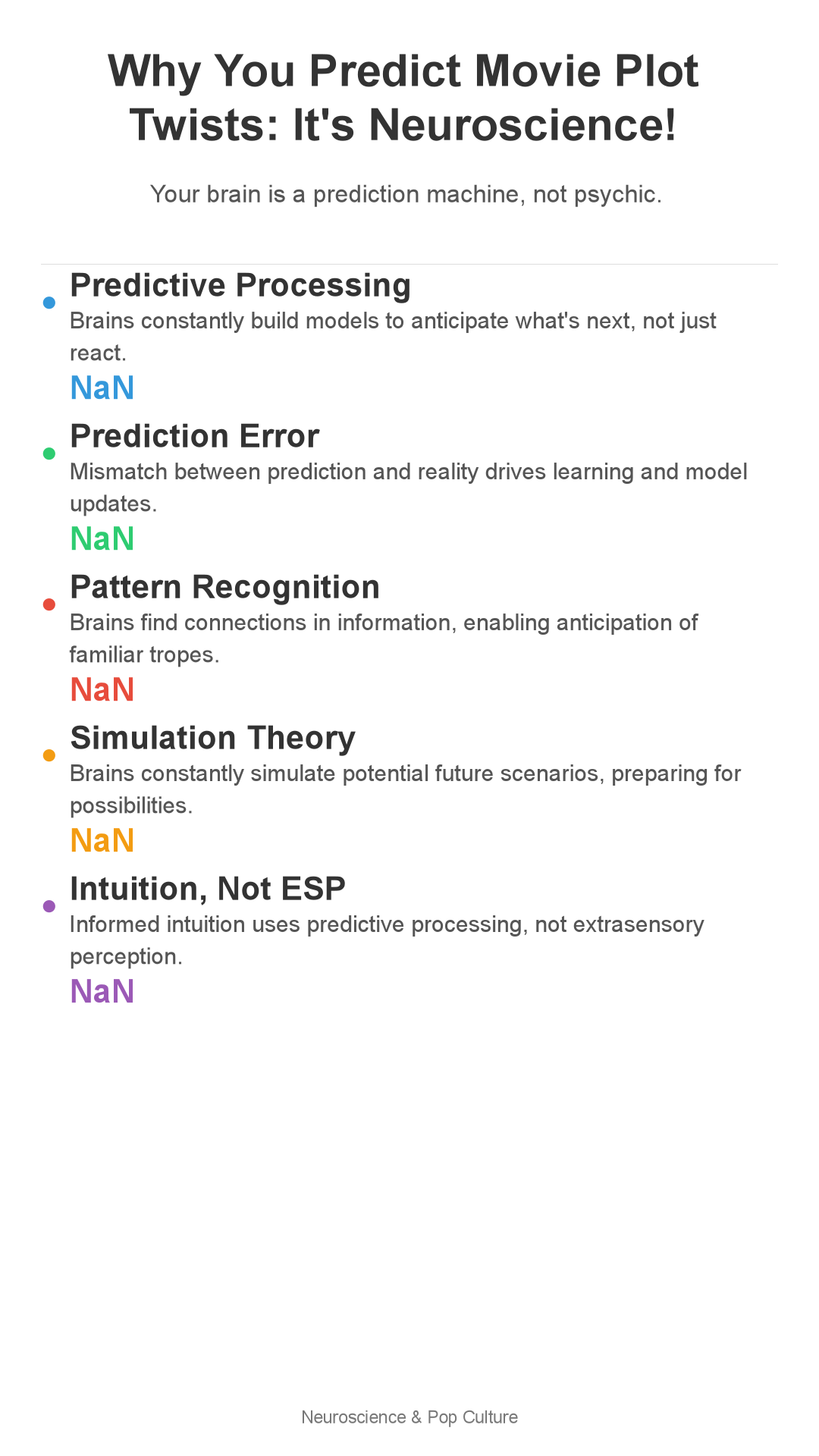
Ever felt like you're one step ahead of the movie screen, predicting the big reveal before anyone el
Ever settled in for a movie night, popcorn in hand, and had that eerie feeling you *knew* what was about to happen? Not just a guess, but a deep-down certainty? That déjà-vu plot prediction might be more than luck. Let’s explore the fascinating science behind why your brain sometimes seems to tap into something… extra-sensory.
Okay, smash that like button if you’ve ever felt like a movie-predicting oracle! And definitely follow for more dives into the bizarre intersection of science and pop culture.
Now, about that uncanny knack for knowing what’s coming next on screen: Is it psychic powers? Or is your brain simply a super-charged prediction machine?
Predictive Processing: Your Brain as a Prediction Machine
The Brain’s Constant Guessing Game
Forget passively reacting to the world. Neuroscience increasingly reveals that our brains are primarily *predictive*.
This concept, called Predictive Processing, suggests that your brain constantly builds models of the world and uses them to anticipate what’s next. It’s not just receiving information; it’s actively trying to figure things out *before* they occur.
[IMAGE: A graphic illustrating predictive processing: Sensory input going into the brain, being compared to an internal model, and then generating a prediction.
How Predictive Processing Works
So, how does this prediction magic actually work? Your brain constantly compares incoming sensory information (what you see, hear, feel, smell, taste) with its internal models.
If there’s a match, fantastic! Your brain confirms its prediction. But if there’s a mismatch – an unexpected plot twist, for example – that creates a “prediction error” signal.
This signal drives learning, updating your internal model and making future predictions even more accurate.
Beyond the Silver Screen: Real-Life Predictions
Predictive processing isn’t just about movies; it’s happening all the time! Recognizing a friend’s face in a crowded street? Knowing how they’ll react to a particular joke?
Anticipating the next step in a familiar recipe? All predictive processing. It’s how we navigate the world efficiently and effectively. Remember that time you *knew* your friend would *hate* that new art exhibit?
Pattern Recognition: Connecting the Dots (Even Subconsciously)
The Brain’s Pattern-Detecting Superpower
Humans are pattern-recognition masters. Our brains are wired to find connections, even subtle ones, in the information we receive.
This ability is crucial for everything from learning a new language to understanding complex social situations.
Movie Tropes and Predictable Plots
Consider this: how often have you encountered the “reluctant hero” trope in a fantasy story? Or the “redemption arc” in a character drama?
These are patterns we’ve seen countless times, and our brains instantly recognize them. This allows us to anticipate plot developments based on established character archetypes, common narrative structures, and familiar storytelling devices.
When the seemingly heartless villain shows a flicker of vulnerability, your brain whispers, “They’re going to have a change of heart!
Prior Experiences and Learned Narratives
Our prior experiences and learned narratives significantly influence our pattern recognition.
The more movies you’ve watched, the more books you’ve read, the more stories you’ve heard, the better you become at identifying patterns and predicting what’s going to happen next.
It’s like building a vast database of narrative possibilities within your brain.
Simulation Theory: Running the Scenarios
The Brain’s Internal Rehearsal
Beyond simply recognizing patterns, our brains are constantly simulating potential future scenarios.
We’re not just passively observing; we’re actively imagining different outcomes and mentally preparing ourselves for various possibilities.
Mirror Neurons and Vicarious Experiences
Mirror neurons are key to this simulation process. These fascinating neurons fire both when we perform an action and when we observe someone else performing that same action.
This allows us to experience emotions and actions vicariously, helping us predict character behavior.
Vague Feelings vs. Clear Predictions
The complexity of these simulations varies. Sometimes, it’s just a vague sense of unease or anticipation. Other times, it’s a crystal-clear prediction of precisely what’s about to unfold.
It all depends on the strength of the patterns, the level of emotional engagement, and the available information. I remember watching a suspense film and experiencing this overwhelming feeling of dread right before the killer was revealed.
Intuition vs. “Psychic” Ability: Drawing the Line (or Not?)
Informed Intuition vs. ESP
So, are we psychic, or just exceptionally good at predicting?
It’s crucial to distinguish between informed intuition – based on the predictive processing, pattern recognition, and simulation processes we’ve discussed – and genuine extrasensory perception (ESP).
The Limitations of ESP Research
The scientific community remains highly skeptical of ESP. While studies have explored paranormal phenomena, the results are often inconsistent and difficult to replicate under controlled conditions.
The burden of proof rests on those claiming psychic abilities, and thus far, the evidence hasn’t met the rigorous standards of scientific inquiry.
Acknowledging the Possibility
While emphasizing the scientific basis of our predictive abilities, it’s important to acknowledge that there might be more to intuition than we currently understand.
Perhaps subtle cues and connections exist that our conscious minds miss, but our brains subconsciously process. Maybe, just maybe, there’s a tiny element of something “extra” at play.
Conclusion
In summary, our brains are prediction powerhouses, constantly analyzing patterns, simulating scenarios, and anticipating what’s next.
This predictive processing, combined with pattern recognition and embodied simulation, can create the sensation of being “psychic” when watching movies (or navigating life in general).
So, the next time you call a plot twist before it happens, remember it’s likely your remarkable brain doing its thing. But hey, a little bit of mystery is always fun, isn’t it?
Now, I’m curious: What’s the most impressive movie plot twist you ever predicted, and what made you suspect it was coming? Share your stories in the comments below! And don’t forget to subscribe for more brain-bending explorations of science and pop culture!

Enjoyed this? Check out our YouTube channel for video versions!
Enjoyed this? Check out our YouTube channel for video versions!



